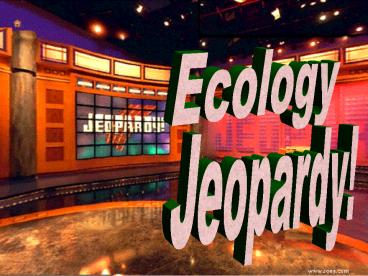Middle East Jeopardy - PowerPoint PPT Presentation
Title:
Middle East Jeopardy
Description:
ecology Jeopardy 100 200 100 200 300 400 500 300 400 500 100 200 300 400 500 100 200 300 400 500 100 200 300 400 500 Terms Interactions Graphs and Randomness Terms II ... – PowerPoint PPT presentation
Number of Views:104
Avg rating:3.0/5.0
Title: Middle East Jeopardy
1
Ecology
Jeopardy!
2
(No Transcript)
3
ecology Jeopardy
Terms Interactions Graphs and Randomness Terms II Grab Bag
100
100
100
100
100
200
200
200
200
200
300
300
300
300
300
400
400
400
400
400
500
500
500
500
500
FINAL
4
Terms 100
- Resources like food, temperature, space, that
may change the growth of a population, are
considered to be this
Limiting Factors
5
Terms 200
- Information collected in any study, whether it is
a lab or in nature
Data and/or Observations
6
Terms 300
- An area on earth characterized by its vegetation,
temperature, rainfall, and biodiversity
biome
7
Terms 400
- Name the 3 forms in which nitrogen exists during
the nitrogen cycle
Ammonia, Nitrate, Nitrogen Gas
8
Terms 500
- Multiple species living in the same environment
are all belong to one _____.
Community
9
Interactions 100
- A relationship in which two or more populations
of organisms live together and interact with each
other.
Symbiosis
10
Interactions 200
- A symbiotic interaction in which one organism
benefits and the other is unaffected.
Commensalism
11
Interactions 300
- Intestinal bacteria (E. coli) that help humans
digest food are supplied with nutrients from what
we eat. This is an example of what kind of
symbiosis?
Mutualism
12
Interactions 400
- The name of the organism that benefits in an
interaction where the host suffers.
Parasite
13
Interactions 500
- A relationship in which one organism always
suffers death as a result of the interaction.
Predator-Prey
14
Graphs and Randomness 100
- The red line on the following graph represents
what information?
This populations Carrying Capacity
15
Graphs and Randomness 200
- Give a likely explanation for the behavior of
this graph. What happened to this population?
This population exceeded its carrying capacity
16
Graphs and Randomness 300
- Rats would be considered what, in this diagram?
Primary Consumers
17
Graphs and Randomness 400
- What was the name of the plasmid that was
incorporated into our bacteria for the
transformation lab?
pBlu
18
Graphs and Randomness 500
- Graph the following data and report what the
carrying capacity would be for this population of
bacteria.
Day of bacteria
1 2 3 4 5 30 160 400 510 512
510-520
19
Terms II 100
- the gradual and orderly process of change in an
ecosystem brought about by the progressive
replacement of one species by new ones.
succession
20
Terms II 200
- The maximum number of organisms that can be
supported by the resources in any given
environment.
Carrying Capacity
21
DAILY DOUBLE Terms II
- This characteristic of populations refers to the
number of organisms that occupy a certain amount
of space. In other words, a large number of
organisms in an environment has a high whereas
a small number of organisms in that same space
would have a low .
Population Density
22
Terms II 400
- The 2 fatty acids that make up Lorenzos Oil.
Erucic Acid and Oleic Acid
23
Terms II 500
- This is defined as an organisms role in the
community in which it lives (e.g., what it eats,
where it lives, and its relationships with other
organisms).
Niche
24
Grab Bag 100
- Ms. Temploras favorite type of animal
Insects
25
Grab Bag 200
- Name 3 enzymes.
?
26
Grab Bag 300
- What is converted to Acetyl CoA (first molecule
that enters Krebs Cycle) by the loss of a carbon
atom.
Pyruvate
27
Grab Bag 400
- Name the famous Greek mathematician that came up
with this a2 b2 c2
Pythagoros
28
Really Hard Grab Bag 500
- The intermediate molecule that is formed when
water and carbon dioxide combine. Hint It helps
the solution become more acidic.
Carbonic Acid
29
FINAL JEOPARDY
Explain the concept of interdependence.
All organisms (living things) on earth depend on
each other, whether it is directly or indirectly.































